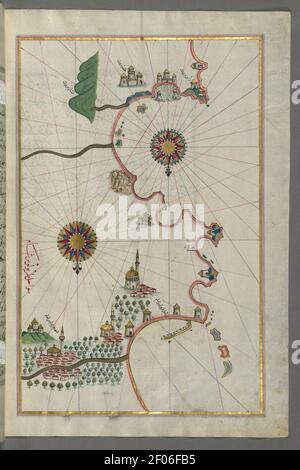Zeno of Citium: The Founder of Stoicism
The annals of history are punctuated with figures whose ideas have carved out significant paths in philosophical thought. Among these figures, Zeno of Citium stands prominent as the founder of Stoicism, a school of philosophy that has continued to influence both ancient and modern thinking. Born around 334 BCE in Citium, a Greek city on the island of Cyprus, Zeno's life journey led him from the commercial ventures of his family to the pursuit of wisdom that would ultimately form the foundation of Stoic philosophy.
The Journey to Athens and the Birth of Philosophy
Zeno's story is often described with a blend of historic facts and legendary anecdotes, a testament to his enduring impact. Born into a merchant family, Zeno initially followed the sea-faring trade of his ancestors. His journey to Athens, however, marked a turning point in his life. As legend has it, Zeno arrived in the city after surviving a shipwreck, which inadvertently set the stage for his philosophical career.
Athens, during the time of Zeno's arrival, was a vibrant hub of philosophical activity, home to influential schools such as Plato’s Academy and Aristotle’s Lyceum. This environment captivated Zeno, who was eager to learn and explore the intellectual landscapes of the city. It was within the bustling marketplace of Athens, the Agora, where his fateful encounter with a book on Socrates is said to have occurred. Intrigued by its content, Zeno sought guidance on where he could meet scholars like the ones he read about, leading him to Crates of Thebes, a renowned Cynic philosopher.
The Influence of Cynicism and Other Philosophies
Under Crates, Zeno was introduced to Cynicism, an ascetic and virtue-centered philosophy. The Cynics advocated for a life lived in accordance with nature, free from societal constraints and material wealth. This radical simplicity deeply resonated with Zeno and became a fundamental aspect of the Stoic philosophy he later developed. However, Zeno remained a seeker, studying under various other philosophers, including the Megarian Stilpo, who emphasized logical rigor, and the Platonist Xenocrates.
Through these diverse philosophical engagements, Zeno began to formulate his own ideas. He synthesized elements from Cynicism, Socratic moral teachings, and the logical discipline of the Megarians. The confluence of these influences culminated in the establishment of his school of thought, Stoicism, which he began teaching around 300 BCE. His public lectures were famously held on the painted porch, or "Stoa Poikile," from which the term "Stoicism" derives.
Core Tenets of Zeno’s Stoicism
At its core, Stoicism is a philosophy that emphasizes the application of reason and virtue as the path to achieving a good life. Zeno posited that true happiness, or eudaimonia, is found not in external possessions or statuses, but in the alignment of one's life with nature and understanding one’s role within the cosmos. This framework proposes that individuals must cultivate virtues—wisdom, courage, justice, and temperance—and practice self-control over their desires and emotions, which are often the source of human suffering.
A central doctrine introduced by Zeno is the concept of "living according to nature," an idea reflecting a commitment to the rational order of the universe and recognizing one's part in this larger whole. To the Stoics, everything is interconnected through the "Logos," a divine reason or universal law governing all existence. By living in harmony with the Logos, individuals can achieve inner peace and resilience against life's adversities.
Zeno’s Lasting Legacy
The philosophical system that Zeno initiated grew and flourished, extending well beyond his tenure. His ideas were built upon by later Stoics such as Cleanthes and Chrysippus, who expanded and refined Stoic logic, physics, and ethics. In the centuries following Zeno's death, Stoicism became one of the most influential schools of thought in the Greco-Roman world, impacting a range of prominent figures from Seneca to the Roman Emperor Marcus Aurelius.
Zeno's philosophy laid the groundwork for a structured approach to personal development and ethical living that still resonates in contemporary society. Modern interpretations of Stoicism have found relevance in fields ranging from psychology to leadership, offering practical tools to navigate the complexities of modern life. Mindfulness, emotional resilience, and the focus on what is within one’s control are contemporary reflections of Zeno’s original teachings.
In conclusion, Zeno of Citium's journey from a merchant of Cyprus to a philosophical pioneer in Athens illustrates the timeless quest for wisdom and the transformative power of philosophical inquiry. Through his founding of Stoicism, Zeno provided a blueprint for living a life of virtue, reason, and harmony with nature—a legacy that continues to offer guidance and insight in an ever-changing world.
The Expansion and Endurance of Stoic Thought
As Stoicism expanded beyond its Athenian origins, it evolved through the contributions of Zeno's successors and disciples. After Zeno's death around 262 BCE, his teachings were carried forward by figures like Cleanthes and Chrysippus, who played crucial roles in the formalization and systematization of Stoic philosophy. Chrysippus, in particular, is often credited with making substantial contributions to the development of Stoic logic and epistemology, helping to define the school’s doctrines with greater precision and depth.
While Zeno laid the groundwork for Stoicism, Chrysippus is often regarded as the co-founder of the school due to his extensive writings and contributions, which exceeded those of his mentor. He emphasized the Stoic logic, perhaps with even more vigor than Zeno, crafting detailed arguments about the nature of knowledge, perception, and rationality. This intellectual rigor ensured that Stoicism offered comprehensive explanations suited to the philosophical inquiries of the time.
The Roman Adaptation of Stoicism
As the influence of Stoicism expanded, it found a new audience in the Roman world, where it was adapted and further developed by philosophers and statesmen. The pragmatic nature of Stoicism, with its focus on personal ethics and virtue, resonated deeply with the Roman ethos. Major figures such as Seneca, Epictetus, and Marcus Aurelius became key proponents of Stoic philosophy during the Roman Empire.
Seneca, a statesman and advisor to Emperor Nero, advocated for the practical application of Stoic principles to daily life, emphasizing ethics, the management of desire, and emotional restraint. His essays and letters have provided a wealth of insights into how Stoicism could be lived out in the context of Roman society. Seneca's works remain a central resource in understanding the adaptation of Stoicism to civic and personal contexts.
Epictetus, unlike Seneca, was born a slave but grew to become a revered teacher. He didn’t leave behind any writings himself, but his teachings were preserved by his student Arrian. Epictetus focused on the dichotomy between what is within our control and what is not, reinforcing the Stoic idea that wisdom involves understanding and accepting the limits of our influence over external events. His emphasis on personal freedom through moral autonomy and rational action imparted a democratic angle to Stoicism, making it accessible to a broader audience.
Marcus Aurelius, often called the philosopher-emperor, provides perhaps one of the most direct links between Stoic thought and leadership. In his "Meditations," he explores the application of Stoic principles in both his personal and political life. This text offers a profound insight into how Stoicism can guide individuals in positions of power and responsibility. Marcus Aurelius exemplifies how Stoic thought could be interwoven with practical governance, showcasing its relevance in diverse arenas of life.
Enduring Influence in Modern Times
The principles of Stoicism, largely anchored in the teachings of Zeno and his intellectual descendants, have continued to influence philosophical discourse and personal development strategies throughout history. In contemporary times, Stoicism has experienced a resurgence, largely due to its practical applications in fields like psychology and self-help.
Cognitive Behavioral Therapy (CBT), a widely practiced psychological intervention, finds its philosophical roots in Stoic thought. CBT’s emphasis on recognizing and restructuring irrational beliefs mirrors the Stoic practice of evaluating and modulating one’s thoughts. The rational and reflective nature of Stoic practices provides a foundation for therapeutic models that aid individuals in managing stress, anxiety, and depression.
Moreover, the philosophical tenets proposed by Zeno have been adapted into management and leadership paradigms. With an increasing interest in mindfulness and emotional intelligence, the Stoic focus on cultivating a disciplined and balanced mind has been integrated into leadership training and development. Leaders are often encouraged to practice self-awareness and resilience, drawing on Stoic teachings to create stable and effective environments.
The Stoic Perspective on Modern Challenges
In the face of existential challenges and rapid societal changes, Stoicism offers a timeless framework for addressing modern issues. Its emphasis on rationality and virtue provides tools for navigating moral dilemmas and fostering resilience in the face of adversity. This ability to adapt Stoicism's core principles to contemporary needs illustrates its enduring versatility as a philosophical doctrine.
The Stoicism that Zeno of Citium pioneered continues to speak to the universal human condition, addressing the perpetual quest for meaning, contentment, and wisdom. The philosophical lineage from Zeno through to Roman Stoics and into modern interpretations highlights the adaptability and relevance of Stoicism as a guideline for ethical living and personal fulfillment.
In summary, Zeno’s contributions to philosophy laid the foundations for a school of thought that transcends time and culture. The evolution and longevity of Stoicism testify to the enduring appeal of living in harmony with reason and nature—an aspiration that continues to guide those searching for meaning in an increasingly complex world.
Stoicism in Popular Culture and Beyond
In recent years, Stoicism has found a place not just in academic and therapeutic circles but also in popular culture, influencing how individuals view personal development and resilience. This phenomenon owes much to the accessibility and applicability of Stoic teachings in modern life. Influencers, writers, and entrepreneurs frequently reference Stoic principles to promote mental fortitude and a balanced approach to life's challenges, underscoring the philosophy's relevance across various domains.
The rise of digital platforms has amplified this resurgence, allowing a wide range of individuals to explore and disseminate Stoic concepts. Podcasts, social media groups, and online courses dedicated to Stoicism have proliferated, introducing new audiences to its principles. Such platforms often feature discussions on how Stoic wisdom can be employed to enhance productivity, foster emotional intelligence, and maintain equilibrium in the face of turbulent global events.
Contemporary literature has also played a significant role in the popularization of Stoicism. Books like Ryan Holiday's "The Daily Stoic," which offers practical advice drawn from ancient Stoic texts, have captivated a modern readership seeking philosophical insight into daily living. By bridging the gap between ancient wisdom and contemporary life, these works reinforce the timeless utility and appeal of Stoic thought.
The Role of Community and Practice in Stoicism
The enduring legacy of Zeno of Citium is not merely contained within the abstract realm of philosophy but is also manifested in the communities that engage in the practical application of Stoic teachings. Historically, Stoic teachings always emphasized the practical implementation of philosophical ideas in life’s everyday aspects. This pragmatic aspect of Stoicism has led to the formation of communities of practice where individuals come together to explore and embody Stoic principles.
Stoic communities, both online and face-to-face, serve as supportive environments where participants can share insights and experiences as they apply Stoic principles. These collectives often engage in activities like daily reflections, discussions, and exercises geared towards fostering the Stoic virtues of wisdom, courage, justice, and temperance. The communal aspect of Stoicism helps practitioners cultivate resilience and mindfulness, empowering them to navigate life's complexities with greater ease.
Workshops, conferences, and retreats centered around Stoicism provide further opportunities for engagement. Events like Stoicon, an annual conference dedicated to Stoic philosophy, bring together scholars, enthusiasts, and newcomers. These immersive experiences not only celebrate the rich history of Stoicism but also explore its practical applications in various contemporary contexts—from personal well-being to business ethics.
Conclusion: The Timeless Relevance of Zeno’s Vision
Zeno of Citium's contribution to the world of philosophy extends far beyond the intellectual confines of his own era. By establishing the Stoic school, Zeno provided a framework for living that speaks to the fundamental human quest for virtue, purpose, and tranquility. Rooted in the idea of rational living in accordance with nature, Stoicism offers enduring guidance on how to align personal actions with broader ethical principles.
The enduring relevance of Stoicism lies in its universal application to the human condition. Whether through grappling with personal challenges, engaging with civic responsibilities, or seeking purpose in an often chaotic world, the teachings of Zeno and his Stoic successors continue to offer wisdom and direction. In a modern world characterized by rapid change and uncertainty, Stoicism's emphasis on resilience, rationality, and inner peace provides a steadfast compass.
In revisiting the legacy of Zeno of Citium today, we find a rich tapestry of thought that not only weathered the passage of millennia but continues to inspire and empower individuals across cultures and generations. The philosophical foundation laid by Zeno remains a testament to the timeless human endeavor to seek understanding, cultivate virtue, and find harmony in an ever-evolving world. As Stoicism perpetually adapts to meet the demands of contemporary life, it remains a beacon of clarity and purpose, illuminating the path toward a more conscious and fulfilling existence.























Comments